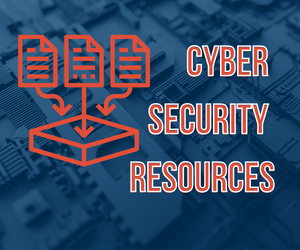
Large corporations, small businesses, and even individuals can benefit from helpful and accessible cyber security resources. Many of these resources include education and prevention when it comes to cyber-attacks.
One of the first tips given by the Cybersecurity and Infrastructure Security Agency is to practice good cyber hygiene and train your staff.
“Establish and enforce strong password requirements for all users and require multi-factor authentication (MFA) for all remote users and those with administrative access. Enable auto-update for software where possible. Where auto-update is unavailable or infeasible, prioritize updating applications that are accessible via the Internet. Consider using a Managed Security Provider (MSP) for many security services. Consider using a Cloud Service Provider (CSP) to host your organization’s data, applications, and services. Particularly consider using a Software-as-a-Service provider for email and workplace productivity solutions, such a Google Workspace or Microsoft Office365.” (CISA).
Another tip is to familiarize yourself with the tools and resources available to you. The CISA offers a number of free guides and informational lists and articles, including a list of open-source tools.
“CISA’s Cyber Essentials guide helps small businesses owners and leaders just starting their journey to implement cybersecurity practices into their organizations. Review and use our list of free cybersecurity tools and services - a living repository that houses cybersecurity services provided by CISA, widely used open-source tools, and free tools and services offered by private and public sector organizations across the cybersecurity community. We also recommend following our 4 Things You Can Do To Keep Yourself Cyber Safe tips, reading the Bad Practices to avoid, and checking out our Cyber Hygiene Services.” (CISA).
Open-source security software can be beneficial to businesses who utilize it correctly.
“According to a survey released late last month, by Aqua Security, most security professionals are in favor of using open source security software and tools. In the survey of 100 CISOs at Fortune 1000 companies, 70% said that open source security solutions offered a faster way to secure their environments, and 78% said that they offered the latest and greatest innovations in cloud security.” (Data Center Knowledge).
However, there are also risks involved with open-source software in addition to the convenience aspect.
“According to Synopsys' 2021 open source security and risk analysis report, 98 percent of enterprise software projects, both internal and commercial, contain some open source code. ‘Pretty much any software originated in open source somewhere,’ said Prakash Sutheraman, CISO at CloudBees, an enterprise software delivery company.” (Data Center Knowledge). “Open source software can be vulnerable, Sutherman said. Many people believe that open source is secure because anyone can look at the code and examine it for vulnerabilities. But that doesn't mean that people do.”
Have any questions about cyber-security? Responsive Technology Partners is the leading cyber-security expert in the Athens, Metter, Milledgeville, Vidalia, and Atlanta, Georgia areas. We also have locations in Tampa, Florida, Roanoke, Virginia, and Raleigh South Carolina. Service offerings include I.T. support, cyber-security and compliance, telephony, cloud services, cabling, access control, and camera systems. Our company’s mission is to provide world-class customer service through industry leading I.T. solutions that make every customer feel as if they are our only customer. Please visit our website to learn more: https://www.responsivetechnologypartners.com/.
Sources:
Data Center Knowledge. https://www.datacenterknowledge.com/security/fantastic-open-source-cybersecurity-tools-and-where-find-them




